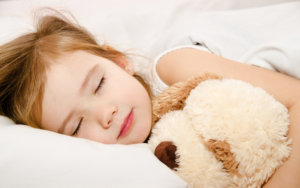Does Your Child Need a Sleep Doctor?

Sleep disorders are very common in children, with rates between 25-40%. Unfortunately, the vast majority go unrecognized and untreated, even though there are good treatments for most pediatric sleep disorders. ADHD symptoms and symptoms for sleep disorders in children can also overlap, exacerbate each other or cause misdiagnosis.
Children suffer from many of the same sleep disorders as adults:
- Obstructive sleep apnea
- Restless legs syndrome
- Periodic limb movement disorder
- Insomnia
Any of these sleep disorders can, and usually do, lead to chronic sleep deprivation.
Sleep Disorders in Children (Especially ADHD Children) are Often Missed
Sleepy children do not act like sleepy adults. In fact, sleep-deprived children are more likely to display hyperactivity and inattention than they are hypersomnia (sleepiness).
When “trouble sleeping” is identified, I frequently recommend an evaluation by a sleep specialist, even if the only sleep disorder symptom is a behavioral, learning or psychiatric problem. It does not necessarily mean that the child needs a sleep test, but only a trained sleep doctor can determine which of these children needs further sleep diagnostics. Clear indications for further sleep evaluation include:
- Snoring
- Heavy or very light breathing at night
- Sweating during sleep
- Sleeping in strange positions (especially with head thrown back, neck hyperextended)
- Complaining of restlessness at night or a funny feeling in the legs or arms
- Inability to fall asleep or stay asleep
- Resisting going to bed
- Awaking frequently in the middle of the night and needing attention from the parent
- Napping after age 5-6
- Bedwetting (especially if the child had a dry spell but then bedwetting resumed)
Article continues below...
Treatment for your Child's ADHD
Download a free tip sheet "Recommended Treatment for ADHD: Medication & Behavior Management" for what's really recommended for your child or teen.
Is it ADHD or a Sleep Disorder?
Sleep deprivation can mimic ADHD, as it causes the same signs and symptoms of ADHD. This can lead to misdiagnosis. In one study, nearly half the children who were diagnosed with ADHD did not meet the diagnostic criteria one year later, after they had adenotonsillectomy for treatment of obstructive sleep apnea. While sleep disorders are usually considered in this patient population after all else has failed, I believe it is critical that pediatricians, psychiatrists and psychologists evaluate for sleep disorders in all children who are suspected to have behavioral, learning or psychiatric disorders. Sleep should be one of the first considerations, not the last.
Of course in many children's cases, sleep disorders and ADHD are not mutually exclusive. Since there is often an overlap of these syndromes, optimal treatment of each disorder makes treating the other one easier. On the other hand, missing a sleep disorder in children with ADHD makes the treatment of the ADHD all the more difficult.
If your child has difficulty sleeping, in addition to having a sleep consultation with a sleep medicine physician, here are some tips to getting a better night's sleep:
Sleep Tips for Children
- Ensure adequate sleep times. Children need much more sleep than adults. School-age children need 10-12 hours per night, while teens typically need 9-9 ½ to feel their best.
- No screens for 1 hour before bed.
- Maintain a routine. This is essential. A typical routine involves bathing/showering, teeth brushing, hair combing and then reading/hearing a story. The bedtime routine should not last more than about 30 min.
- Maintain fairly firm sleep and wake times. Children can stay up 1 hour later on weekends or special occasions, but it is best not to vary more than this, especially if the child has sleep troubles.
- No heavy meals, especially no sugar/simple carbohydrates for 2 hours before bed.
- Room should be cool, dark and quiet. If a night light is necessary, have it far from the bed and get one that does not emit blue wavelength.
- As a general rule, no rough playing or vigorous exercise for 1-2 hours before bed. However, some children with ADHD sleep better with some hard playing about 1 hour before bed. Experiment with this.
- Don't do anything to help the child fall asleep that you are not willing and able to repeat several times during the night.
- After tucking the child in and kissing goodnight, leave the child drowsy, (one hopes) but still awake so the child becomes accustomed to falling asleep while alone in bed (or at least without a parent present).
- Pay careful attention to the dosing times of medications, as many medications for depression, anxiety, allergies, and asthma can affect the sleep/wake cycle. The obvious concern is that stimulant medications used to treat ADHD can cause insomnia.
Remember, if a child is chronically sleep-deprived, either from reduced sleep quantity or poor sleep quality, then their ADHD symptoms will be worse and harder to manage with either pharmaceutical or behavioral treatments.
In order to find a qualified sleep specialist in your area, go to the website of the American Academy of Sleep Medicine, www.aasmnet.org.
References
- Chervin RD et al. Inattention, hyperactivity and symptoms of sleep-disordered breathing. Pediatrics 2002;109(3):449-56
- Chervin RD et al. Sleep-disordered breathing, behavior and cognition in children before and after adenotonsillectomy. Pediatrics 2006;117(4):e769-78.
- O'Brien LM. The neurocognitive effects of sleep disruption in children and adolescents in Sleep, Memory and Learning, Stickgold R, ed. Elsevier 2011.

